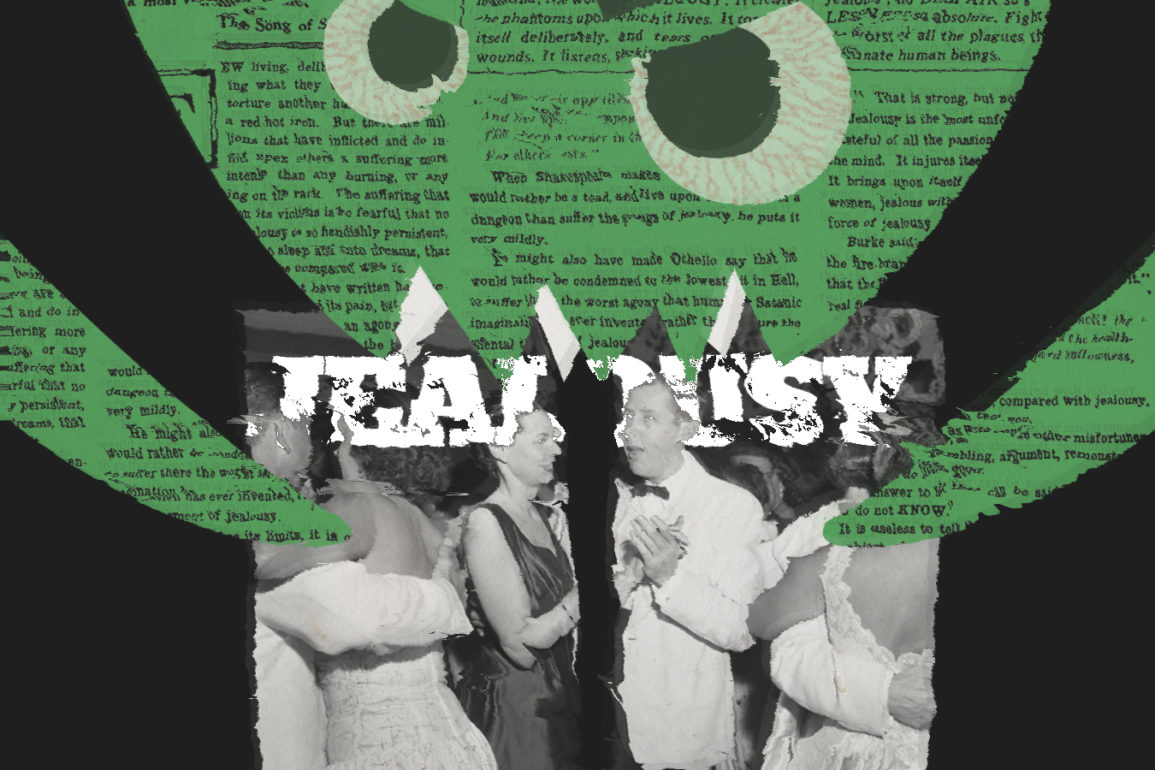Ball State students discuss their personal experiences with jealousy and envy.
Jealousy — remember that little green monster our parents used to mention? Turns out it never really goes away, but that doesn’t mean we can’t learn from it.
Jennifer Bevan, a professor of communication at Chapman University, describes jealousy as a perceived threat to a valued relationship from a third party.
Although jealousy follows us through our lives, Robert Sternberg of Cornell University says jealousy is something teens and college students feel more intensely than any other age group because it can be an uncertain time.
Makieya Street, a senior at Ball State University, felt an overwhelming sense of jealousy over her friends. Before she could express her feelings to a crush, they began a relationship with another friend of hers.
She wanted so badly to have the connection that the two of them were now sharing, but could only watch from the outside.
“I felt angry both at myself and them for feeling so jealous about their relationship. They were both really good friends of mine, but because I was so jealous I couldn’t stand to be around them for long,” says Makieya.
“I didn’t think they wouldn’t understand, I knew that they would, I just wanted to be able to understand my feelings myself and I was angry that I didn’t,” says Makieya.
In the end, Makieya was able to talk with her friends and resolve her feelings, but it didn’t happen without self-reflection.
Bevan says the number one way to deal with jealous tendencies is to communicate in a calm manner, no shouting or fighting. An open and understanding environment makes all the difference, says Bevan.
“My research has actually found that when romantic partners express their jealousy in these positive ways, their satisfaction with their relationship also increases. But when jealousy is expressed destructively, relationship satisfaction goes down. So communication is so important in this context,” says Dr. Bevan.
Jealousy can sometimes be mistaken for envy. Dr. Bevan and Professor Sternberg were both on the same page when explaining the difference between the two. Jealousy, they agree, is the feeling of needing to guard something you have and envy as the feeling of wanting to obtain something someone else has but you don’t.
Brittany Moore, also a Ball State student, says she has experienced envy during her time at college. She felt envious of her peers who would constantly talk about their parents who were able to financially support them.
“I know that everyone comes from different walks of life, so I couldn’t really be envious because I didn’t know what kind of background they came from. I mean I got over it, but it was annoying hearing peers in class complain they were broke because their parents hadn’t sent them money yet.”
Brittany felt annoyed for a while, but eventually she realized how grateful she was to be acquiring financial skills that would help her later in life. She was gaining skills that some students miss out on until they’re in the world on their own without their parents.
“I still feel annoyed sometimes, but just think about what I do have and how my parents are always there when I need them and it helps put everything back into perspective,” says Brittany.
It’s important to know the difference between jealousy and envy to better understand what you’re feeling. The way to cope with jealousy can be very different or similar to how you cope with envy, but if you don’t understand the difference you can’t rectify the feeling.
“Jealousy is natural and expected when we are in relationships with others who we love and care about. We want those relationships to continue. Our culture depicts jealousy as an unnatural, negative thing. On its own, jealousy can be a signal that you care about a relationship and a person. It’s how you communicate it and act upon it that can become a problem. That’s the part that I study – how we express our jealousy,” says Bevan.
Tips to help with Jealousy:
- Trace it back to the source– When you begin to feel that surge of jealousy, try to take a step back and think about why you’re feeling the way you are. Although it’s healthy to feel jealousy occasionally, you never want it to blind you. Taking actions to figure out the root of the problem can really help to avoid larger conflict.
- Voice your concerns– In the instance you begin to feel jealous within your relationship with someone it’s important to express the concerns right away. Once everything’s out on the table it’s easier to see if it was a simple communication error or if there’s more for the two of you to work out.
- Try talking to a trusted friend – If you’re not comfortable with talking to a therapist, or someone of that nature try opening up to a close friend. Sometime’s the way things are perceived by one person isn’t the way it is for everyone and an outside view can make the difference!
- Put a different spin on Jealousy – Jealousy is often interpreted as a negative emotion that often leads to confusion and a whirlwind of emotions. To help deal with those, try viewing the emotion of jealousy as more of a resource. Now that you feel this you can discover new clarity.
- Rationalize- Jealousy can sometimes blur the big picture. When this happens an individual should take a step back to look at the full picture both about the situation and how they’re viewing themself in the moment. From there it can be easier to move forward with more of a rational solution and better understanding.
- Practice gratitude – The solution of practicing gratitude is nothing complex. Although it won’t result in complete resolution, it will help subside the initial overwhelming feeling jealousy can bring. You’ll be able to see what you have already and be grateful.
- Practice in the moment coping mechanisms- coping with jealousy in the moment will help to keep the stress from overwhelming you. It won’t always help to figure out the root of the feeling, but will help get you to a place where you can explore more in depth.
- Try exploring underlying and past issues- Oftentimes jealousy can stem from anxiety or self esteem issues. In the instance that it’s self esteem issues causing the flare up of jealousy, it’s easy to trace back your values in a relationship, i.e. communication, compassion, etc. Or reminding yourself of self-compassion. When anxiety is leading this feeling it gets tougher to understand the situation, but talking to a therapist or even someone close to you can make all the difference.
- Practice mindfulness- Mindfulness consists of different techniques that cause you to slow down your thinking and really focus. Because of this you are more prone to be able to analyze your thoughts and really get a grasp on why you’re feeling the way you do.
- Simply give it time- In the end jealousy is only a feeling. If you’ve ever dealt with jealousy you probably know that just giving it time can sometimes be the only thing that helps. Eventually the feeling will fade, especially with how quickly our lives and surroundings can change.




